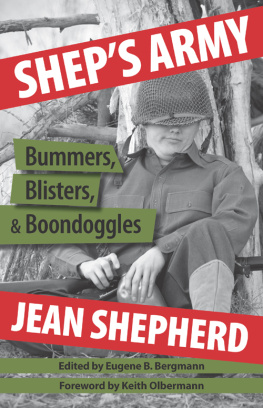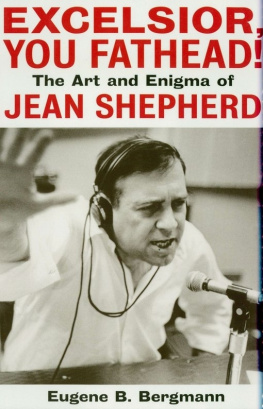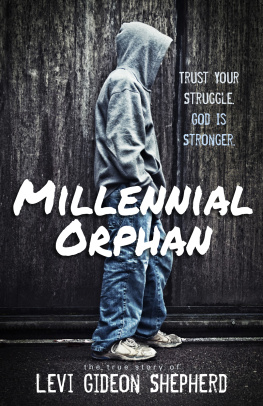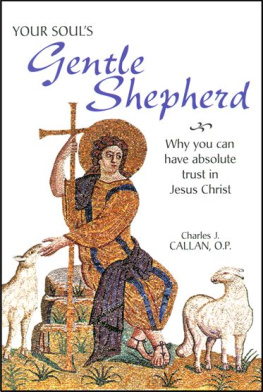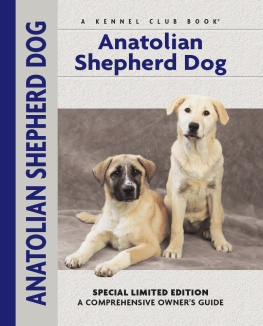Jean Shepherd - In God We Trust, All Others Pay Cash
Here you can read online Jean Shepherd - In God We Trust, All Others Pay Cash full text of the book (entire story) in english for free. Download pdf and epub, get meaning, cover and reviews about this ebook. City: New York, year: 1966, publisher: Broadway Books, genre: Detective and thriller. Description of the work, (preface) as well as reviews are available. Best literature library LitArk.com created for fans of good reading and offers a wide selection of genres:
Romance novel
Science fiction
Adventure
Detective
Science
History
Home and family
Prose
Art
Politics
Computer
Non-fiction
Religion
Business
Children
Humor
Choose a favorite category and find really read worthwhile books. Enjoy immersion in the world of imagination, feel the emotions of the characters or learn something new for yourself, make an fascinating discovery.

- Book:In God We Trust, All Others Pay Cash
- Author:
- Publisher:Broadway Books
- Genre:
- Year:1966
- City:New York
- Rating:3 / 5
- Favourites:Add to favourites
- Your mark:
- 60
- 1
- 2
- 3
- 4
- 5
In God We Trust, All Others Pay Cash: summary, description and annotation
We offer to read an annotation, description, summary or preface (depends on what the author of the book "In God We Trust, All Others Pay Cash" wrote himself). If you haven't found the necessary information about the book — write in the comments, we will try to find it.
In God We Trust, All Others Pay Cash — read online for free the complete book (whole text) full work
Below is the text of the book, divided by pages. System saving the place of the last page read, allows you to conveniently read the book "In God We Trust, All Others Pay Cash" online for free, without having to search again every time where you left off. Put a bookmark, and you can go to the page where you finished reading at any time.
Font size:
Interval:
Bookmark:
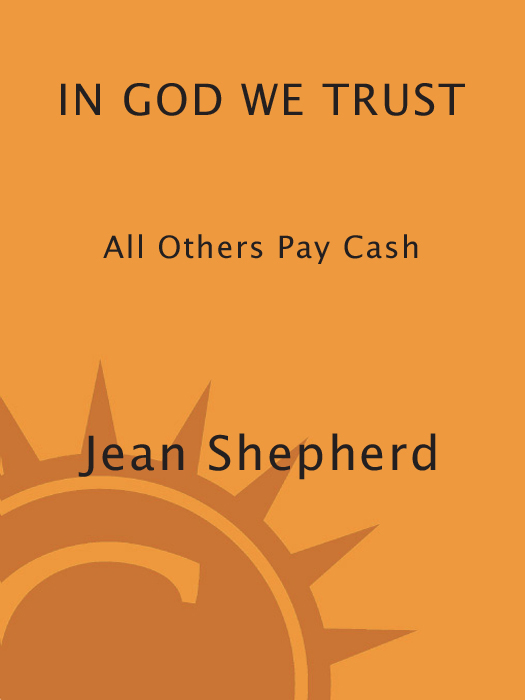
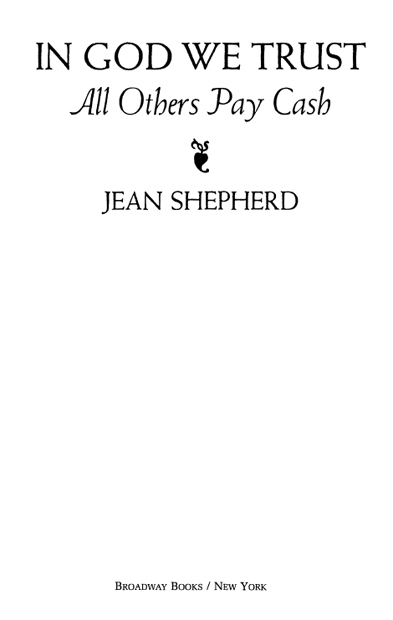

A hardcover edition of this book was originally published in 1966 by Doubleday. It is here reprinted by arrangement with Doubleday.
In God We Trust. Copyright 1966 by Jean Shepherd. All rights reserved. Printed in the United States of America. No part of this book may be reproduced or transmitted in any form or by any means, electronic or mechanical, recording, or by any information storage and retrieval system, without written permission from the publisher. For information, address: Broadway Books, a division of Random House, Inc., 1540 Broadway, New York, NY 10036.
BROADWAY BOOKS and its logo, a letter B bisected on the diagonal, are trademarks of Broadway Books, a division of Random House, Inc.
Visit our website at www.broadwaybooks.com
First Broadway Books trade paperback edition published 2000
originally appeared in Playboy,
Copyright 1964, 1965, 1966 by HMH Publishing Co., Inc.
eISBN: 978-0-307-76866-7
v3.1
The characters, places, and events described herein are entirely fictional, and any resemblance to individuals living or dead is purely coincidental, accidental, or the result of faulty imagination.
Jean Shepherd
To my Mother, and my Kid Brother
And the Rest of the Bunch
THERE ARE AT LEAST TWO KINDS OF EDUCATION.
George Ade
 WE MEET FLICK, THE FRIENDLY BARTENDER
WE MEET FLICK, THE FRIENDLY BARTENDERI felt like a spy. It was the first time I had ever ridden a cab in my own hometown. When I had left it I was definitely not a cab rider. Now taking cabs was as natural as breathing or putting on shoes. I could see the cab driver giving me the eye in his rear-view mirror. He was wearing the standard Midwestern work uniform of lumberjacket, corduroy cap, and a red face.
You from out of town?
He caught me off guard. I had forgotten that out of New York people quite often spoke to other people.
Uh.what?
You from out of town?
Ah yeah, I guess so. Making one of my famous instantaneous decisions, I opted for being from out of town.
Yeah, well, I could tell. Where ya from?
New York. Now, that is.
He mopped his windshield with a greasy rag. The cabs heater was making the windows cloud up. Outside I could dimly see the grimy streets lined with dirty, hard ice and crusted drifts covered with that old familiar layer of blast-furnace dust; ahead of us a long line of dirt-encrusted cars carrying loads of steelworkers, refinery slaves, and railroad men to wherever they spent most of their lives. He went on:
Yep. New York. Me and my wife went there once. For two weeks. We saw the Fair. I sure dont see how anyone can stand to live there.
We continued to rattle through the smoky gray Winter air. I watched a giant gas works drift by our port side. On the starboard a vast, undulating sea of junkyards rolled to the horizon.
Its okay to visit.
I guess he threw that in so as not to hurt my feelings.
Oh, you get used to it.
He blew his nose loudly into a red bandanna and laughed juicily.
Yeah, I guess a guy can get used to anything. If hes gotta.
A crossing gate banged down in front of us, its flashers angrily blinking off and on. A warning bell clanged deafeningly as a giant Diesel locomotive swept across our bow, towing a short string of smelly tankers. Four brakemen clung to their sides, yelling to one another as they roared past.
What was that? I shouted.
I SAID A GUY CAN GET USED TO ANYTHING. He bellowed back.
The gate went up. We were off again. I fished into my briefcase, at last finding the onionskin on which I had written, for my own use, a thumbnail description of the town I was now riding through, my own despised hometown. As we roared and squeaked on, I read over what I had written:
Hohman, Indiana, is located in the extreme Northwestern corner of the state, where the state line ends abruptly in the icy, detergent-filled waters of that queen of the Great Lakes, Lake Michigan. It clings precariously to the underbody of Chicago like a barnacle clings to the rotting hulk of a tramp steamer.
From time to time echoes of the Outside World arrive in Hohman, but they are muted and bear little relevance to the daily life of its inhabitants. Theirs is a world of belching furnaces, roaring Bessemer Converters, fragrant Petroleum distillation plants, and freight yards. Mostly, theirSocial life is found in Bowling halls or Union halls or beer halls, not to mention dance halls and pool parlors.
Theirs is a sandy, rolling country, cooled, nay, frozen to rigidity in the Winter by howling gales that got their start near the Arctic Circle, picked up force over the frozen wastes of Lake Michigan, and petered out in downtown Hohman, after freezing ears, cracking blocks, and stunting the Summer hopes in many a breast.
In Summer the process is reversed, and the land lies still and sear under the blazing Midwestern sun. This is where the first faint beginnings of the Great Plains can be found. A gnarled cactus plant, rolling tumbleweeds; an occasional Snowy Owl. The residents of Hohman are hardly aware of this, although their truculent pride in being Hoosiers is seen everywhere.
Under the soil of most backyards, covered with a thin, drifting coat of blast-furnace dust and refinery waste, made fragrant by the soaked-in aroma of numerous soap factories, lie in buried darkness the arrowheads, stone axes, and broken pots of the departed Indian. Where the tribes danced in Indian summer now grow Used Car lots and vast, swampy junkyards.
Not far from downtown Hohman lie the onion sets and cantaloupe vines of the Dutch immigrant farmers, and then the endless, mile-after-mile monotony of the Indiana cornfields. To the West the sand dunes ring Lake Michigan almost to the border of Michigan itself. To the Norththe Lake. And to the West and NorthChicago.
It is a place people never really come to, but mostly want to leave. And leave they do, to go to the fabled East or to the unbelievable California coast. They rarely talk about where they have come from. There isnt much to say. At night in Hohman the rabbits still hop through the backyard gardens. The trains thunder through the dark on their way to somewhere else. The sky is always lit by the eternal flames of the Open Hearths and blast furnaces. Nothing much has changed, probably least of all those who were born and formed by the Northern Indiana mill-town existence.
Oh yeah? I answered myself. I have never been a fan of my particular style of Official Writer-ese, but, after all, its a living. Its a hell of a lot better than working in the Tin Mill, which we were now passing.
We were getting into painfully familiar country: ragged vacant lots, clumps of signboards advertising paint, American Legion halls, bowling alleys, all woven together with a compact web of high tension wires, telephone poles, and gas stations.
Home is where the heart is. In fact, not more than two blocks from where we now waited for a light I had spent the festering years of my childhood.
I got out of the cab at the intersection and headed directly for Flicks Tavern, the tavern whose floors I had helped to clean as a tot, and where I had learned a few of Lifes seamier lessons. Flick himself had been an old boyhood sidekick who had taken over the tavern from his father, long since passed away. I hadnt seen him since my Army days.
Font size:
Interval:
Bookmark:
Similar books «In God We Trust, All Others Pay Cash»
Look at similar books to In God We Trust, All Others Pay Cash. We have selected literature similar in name and meaning in the hope of providing readers with more options to find new, interesting, not yet read works.
Discussion, reviews of the book In God We Trust, All Others Pay Cash and just readers' own opinions. Leave your comments, write what you think about the work, its meaning or the main characters. Specify what exactly you liked and what you didn't like, and why you think so.

